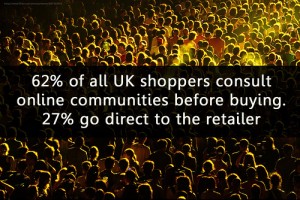What Does Social Shopping Have to Do With Social Media?
I first wrote this post for the Lift Summit blog, where I’ve been contracted to create posts promoting awareness for the event (for money). They have been awesome enough to let me repost it here.
Social shopping networks, where consumers can share information with each other about products and services, have become the standard for online purchases. “The idea is that this kind of sharing can generate authentic conversations around products and services – leading in turn to useful product recommendations, as well as money-making opportunities for targeted ads and e-commerce referrals” (NYTimes.com). It’s a whole world where the advantages and comforts of going shopping with a friend are brought to you at home through the web.
But what does this have to do with social media?
- 53% of people on Twitter recommend companies and/or products in their Tweets, with 48% of them delivering on their intention to buy the product. (ROI Research for Performance, June 2010)
- Users put great trust in their social networks. One-half of Beresford respondents said they considered information shared on their networks when making a decision—and the proportion was higher among users ages 18 to 24, at 65%. (eMarketer, October 2009)
- 44% of Moms use social media for brand/product recommendations; 73% trust online community recommendations. (BabyCenter LLC, July 2009)
For more social shopping stats, visit BazaarVoice.com.
The world of social networks has brought like-minded people together in a way that was never before possible, creating interest-based communities that span the globe. We share our pictures, plans and preferences, and in doing so, build relationships with others over web platforms. Social shopping is just another integral part of this phenomenon. It has created social networks based around our shopping experience. We now have the convenience of shopping from our homes, a coffee shop or the airport, while at the same time getting desirable information and involvement from others—who think like us—to make better purchasing decisions.
For businesses, getting involved in this culture has the potential to greatly increase success rates. Just another step in Marketing 2.0 to get connected personally with the consumer, and adapt to better accommodate their needs.
Lift: The B2B Social Commerce Summit is a “must attend” event for marketing executives, senior management and business owners looking to apply real-world social tactics that drive sales lift to their business. This year’s event will take place on September 23 in Atlanta.
Photo by Will Lion
